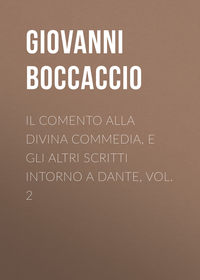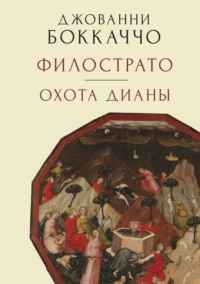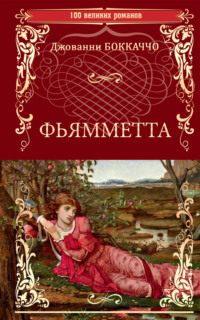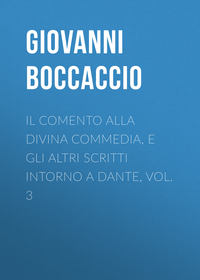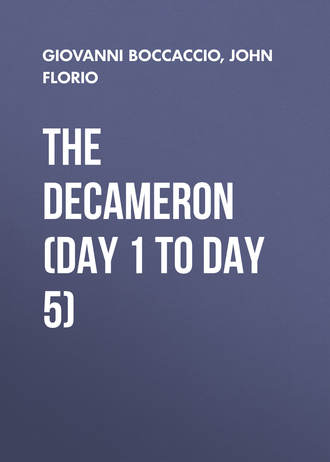 полная версия
полная версияThe Decameron (Day 1 to Day 5)
This soveraigne unction was of such vertue (though Galen speakes not a word thereof among all his chiefest medicines) and so farre prevailed; that the terrible threatening words of fire and fagot, became meerely frozen up, and gracious language blew a more gentle and calmer ayre; the Inquisitor delivering him an hallowed Crucifixe, creating him a Souldier of the Crosse (because he had payed Crosses good store for it) and even as if he were to travell under that Standard to the holy Land; so did hee appoint him a home-paying pennance, namely, to visit him thrice every weeke in his Chamber, and to annoint his hands with the selfe-same yellow unguent, and afterward, to heare a Masse of the holy Crosse, visiting him also at dinner time, which being ended, to doe nothing all the rest of the day, but according as he directed him.
The simple man, yet not so simple, but seeing that this weekely greasing the Inquisitors hands, would (in time) graspe away all his gold; grew weary of this annointing, and beganne to consider with himselfe, how to stay the course of this chargeable penance: And comming one morning, (according to his injunction) to heare Masse, in the Gospell he observed these wordes; You shall receive an hundred for one, and so possesse eternall life; which saying he kept perfectly in his memory, and, as hee was commanded, at dinner time, he came to the Inquisitor, finding him (among his fellowes) seated at the Table. The Inquisitor presently demanded of him, whether he had heard Masse that morning, or no? Yes Sir, replied the man very readily. Hast thou heard any thing therein (quoth the Inquisitor) whereof thou art doubtfull, or desirest to be further informed? Surely Sir, answered the plaine meaning man, I make no doubt of any thing I have heard, but doe beleeve all constantly; onely one thing troubleth me much, and maketh me very compassionate of you, and of all these holy Fathers your brethren, perceiving in what wofull and wretched estate you will be, when you shall come into another World. What words are these, quoth the Inquisitor? And why art thou moved to such compassion of us? O good Sir, saide the man, doe you remember the words in the Gospell this morning? you shall receive an hundred for one. That is very true, replied the Inquisitor, but what moveth thee to urge those words?
I will tell you Sir, answered the plaine fellow, so it might please you to be not offended. Since the time of my resorting hither, I have daily seene many poore people at your doore, and (out of your abundance) when you and your brethren have fed sufficiently, every one hath had a good messe of pottage: now Sir, if for every dishfull given, you are sure to receive an hundred againe, you will all be meerely drowned in pottage. Although the rest (sitting at the Table with the Inquisitor) laughed heartily at this jest; yet he found himselfe toucht in another nature, having (hypocritically) received for one poore offence, above three hundred peeces of gold, and not a mite to be restored againe. But fearing to be further disclosed, yet threatning him with another Processe in Law, for abusing the words of the Gospell; he was content to dismisse him for altogether, without any more golden greasing in the hand.
Bergamino, by telling a Tale of a skilfull man, named Primasso, and of an Abbot of Clugni; honestly checked a new kinde of covetousnesse, in Master Can de la ScalaThe seaventh Novell
Approving, that it is much unfitting for a Prince, or great person, to be covetous; but rather to be liberall to all menThe curteous demeanor of Madam Æmilia, and the quaintnesse of her discourse, caused both the Queene, and the rest of the company, to commend the invention of carrying the Crosse, and the golden oyntment appointed for pennance. Afterward, Philostratus, who was in order to speake next, began in this manner.
It is a commendable thing (faire Ladies) to hit a But that never stirreth out of his place: but it is a matter much more admirable, to see a thing (suddenly appearing, and sildome or never frequented before) to be as suddenly hit by an ordinary Archer. The vicious and polluted lives of Priests, yeeldeth matter of it selfe in many things, deserving speech and reprehension, as a true But of wickednesse, and well worthy to be sharply shot at. And therefore, though that honest meaning man did wisely, in touching Master Inquisitor to the quicke, with the hypocriticall charity of Monkes and Friars, in giving such things to the poore, as were more meete for swine, or to be worse throwne away; yet I hold him more to be commended, who (by occasion of a former tale, and which I purpose to relate) pleasantly reproved Master Can de la Scala, a Magnifico and mightie Lord, for a sudden and unaccustomed covetousnesse appearing in him, figuring by other men, that which he intended to say of him, in manner following.
Master Can de la Scala, as fame ranne abroade of him in all places, was (beyond the infinite favours of Fortune towards him) one of the most notable and magnificent Lords that ever lived in Italy, since the dayes of Fredericke the second Emperour. He determining to procure a very solemne assembly at Verona, and many people being met there from divers places, especially Gentlemen of all degrees; suddenly (upon what occasion I know not) his minde altered, and hee would not goe forward with his intention. Most of them hee partly recompenced which were come thither, and they dismissed to depart at their pleasure, one onely man remained unrespected, or in any kinde sort sent away, whose name was Bergamino, a man very pleasantly disposed, and so wittily ready in speaking and answering, as none could easily credit it, but such as heard him; and although his recompence seemed over long delayed, yet hee made no doubt of a beneficiall ending.
By some enemies of his, Master Can de la Scala was incensed, that whatsoever he gave or bestowed on him; was as ill imployed and utterly lost, as if it were throwne into the fire, and therefore he neither did or spake any thing to him. Some fewe dayes being passed over, and Bergamino perceiving, that hee was neither called, nor any account made of, notwithstanding many manly good parts in him; observing beside, that hee found a shrewd consumption in his purse, his Inne, horses, and servants being chargeable to him: he began to grow extremely melancholly, and yet hee attended in expectation day by day, as thinking it farre unfitting for him, to depart before he was bidden farewell.
Having brought with him thither three goodly rich garments, which had beene given him by sundry Lords, for his more sightly appearance at this great meeting: the importunate Host being greedy of payment, first he delivered him one of them, and yet not halfe the score being wiped off, the second must needes follow, and beside, except he meant to leave his lodging, hee must live upon the third so long as it would last, till hee saw what end his hopes would sort to. It fortuned, during the time of living thus upon his latest refuge, that he met with Maister Can one day at dinner, where he presented himselfe before him, with a discontented countenance: which Master Can well observing, more to distaste him, then take delight in any thing that could come from him, he said. Bergamino, how chearest thou? Thou art very melancholly, I pray thee tell us why? Bergamino suddenly, without any premeditation, yet seeming as if he had long considered thereon, reported this Tale.
Sir, I have heard of a certaine man, named Primasso, one skilfully learned in the Grammar, and (beyond all other) a very witty and ready versifier: in regard whereof, he was so much admired, and farre renowned, that such as never saw him, but onely heard of him, could easily say, this is Primasso. It came to passe, that being once at Paris, in poore estate, as commonly hee could light on no better fortune (because vertue is slenderly rewarded, by such as have the greatest possessions) he heard much fame of the Abbot of Clugni, a man reputed (next to the Pope) to be the richest Prelate of the Church. Of him he heard wonderfull and magnificent matters, that he alwayes kept an open and hospitable Court, and never made refusall of any (from whence so ever hee came or went) but they did eate and drinke freely there; provided, that they came when the Abbot was set at the Table. Primasso hearing this, and being an earnest desirer, to see magnificent and vertuous men; he resolved to goe see this rare bounty of the Abbot, demaunding how far he dwelt from Paris. Being answered, about some three leagues thence; Primasso made account, that if he went on betimes in the morning, he should easily reach thither before the houre for dinner.
Being instructed in the way, and not finding any to walke along with him; fearing, if he went without some furnishment, and should stay long there for his dinner, he might (perhaps) complaine of hunger: he therefore caried three loaves of bread with him, knowing that he could meete with water every where, albeit he used to drinke but little. Having aptly convayed his bread about him, he went on his journey, and arrived at the Lord Abbots Court, an indifferent while before dinner time: wherefore, entring into the great Hall, and so from place to place, beholding the great multitude of Tables, bountifull preparation in the Kitchin, and what admirable provision there was for dinner; he said to himselfe, Truly this man is more magnificent, then Fame hath made him, because shee speakes too sparingly of him.
While thus he went about, considering on all these things, he saw the Maister of the Abbots houshold (because then it was the houre of dinner) commaund water to be brought for washing hands, and every one sitting downe at the Table: it fell to the lot of Primasso, to sit directly against the doore, whereat the Abbot must enter into the Hall. The custome in this Court was such, that no foode should be served to any, of the Tables, untill the Lord Abbot was himselfe first sette: whereupon, every thing being fitte and readie, the Maister of the houshold, went to tell his Lord, that nothing now wanted but his presence onely.
The Abbot comming from his Chamber to enter the Hall, looking about him, as hee was wont to doe; the first man hee saw was Primasso, who being but in homely habite, and he having not seene him before to his remembrance; a present bad conceite possessed his braine, that he never saw an unworthier person, saying within himselfe: See how I give my goods away to be devoured. So returning backe to his Chamber againe, commaunded the doore to be made fast, demaunding of every man neere about him, if they knew the base Knave that sate before his entrance into the Hall, and all his servants answered no. Primasso being extreamely hungry, with travailing on foote so farre, and never used to fast so long; expecting still when meate would be served in, and that the Abbot came not at all: drew out one of his loaves which hee brought with him, and very heartily fell to feeding.
My Lord Abbot, after he had stayed within an indifferent while, sent forth one of his men, to see if the poore fellow was gone, or no. The servant told him, that he still stayed there, and fed upon dry bread, which it seemed he had brought thither with him. Let him feede on his owne (replyed the Abbot) for he shall taste of none of mine this day. Gladly wold the Abbot, that Primasso should have gone thence of himselfe, and yet held it scarsely honest in his Lordship, to dismisse him by his owne command. Primasso having eaten one of his Loaves, and yet the Abbot was not come; began to feede upon the second: the Abbot still sending to expect his absence, and answered as he was before. At length, the Abbot not comming, and Primasso having eaten up his second loafe, hunger compeld him to begin with the third.
When these newes were carried to the Abbot, sodainly he brake forth and saide. What new kinde of needy tricke hath my braine begotte this day? Why do I grow disdainfull against any man whatsoever? I have long time allowed my meate to be eaten by all commers that did please to visit me, without exception against any person, Gentleman, Yeoman, poore or rich, Marchant or Minstrill, honest man or knave, never refraining my presence in the Hall, by basely contemning one poore man. Beleeve me, covetousnesse of one mans meate, doth ill agree with mine estate and calling. What though he appeareth a wretched fellow to mee? He may be of greater merit then I can imagine, and deserve more honour then I am able to give him.
Having thus discoursed with himselfe, he would needs understande of whence and what he was, and finding him to be Primasso, come onely to see the magnificence which he had reported of him, knowing also (by the generall fame noysed every where of him) that he was reputed to bee a learned, honest, and ingenious man: he grew greatly ashamed of his own folly, and being desirous to make him an amends, strove many waies how to do him honour. When dinner was ended, the Abbot bestowed honourable garments on him, such as beseemed his degree and merit, and putting good store of money in his purse, as also giving him a good horsse to ride on, left it at his owne free election, whether hee would stay there still with him, or depart at his pleasure. Wherewith Primasso being highly contented, yeelding him the heartiest thankes he could devise to doe, returned to Paris on horse-back, albeit he came poorly thether on foot.
Master Can de la Scala, who was a man of good understanding, perceyved immediately (without any further interpretation) what Bergamino meant by this morall, and smiling on him, saide: Bergamino, thou hast honestly expressed thy vertue and necessities, and justly reprooved mine avarice, niggardnesse, and base folly. And trust me Bergamino, I never felt such a fit of covetousness come upon me, as this which I have dishonestly declared to thee: and which I will now banish from me, with the same correction as thou hast taught mee. So, having payed the Host all his charges, redeeming also his robes or garments, mounting him on a good Gelding, and putting plenty of Crownes in his purse, hee referd it to his owne choise to depart, or dwell there still with him.
Guillaume Boursier, with a few quaint and familiar words, checkt the miserable covetousnesse of Signior Herminio de GrimaldiThe eight Novell
Which plainly declareth, that a covetous Gentleman, is not worthy of any honour or respectMadam Lauretta, sitting next to Philostratus, when she had heard the witty conceite of Bergamino; knowing, that shee was to say somewhat, without injunction or command, pleasantly thus began.
This last discourse (faire and vertuous company) induceth mee to tell you, how an honest Courtier reprehended in like manner (and nothing unprofitably) base covetousnesse in a Merchant of extraordinary wealth. Which Tale, although (in effect) it may seeme to resemble the former; yet perhaps, it will prove no lesse pleasing to you, in regard it sorted to as good an end.
It is no long time since, that there lived in Genes or Geneway, a Gentleman named Signior Herminio de Grimaldi, who (as every one wel knew) was more rich in inheritances, and ready summes of currant mony, then any other knowne Citizen in Italy. And as hee surpassed other men in wealth, so did he likewise excell them in wretched Avarice, being so miserably greedy and covetous, as no man in the world could be more wicked that way; because, not onely he kept his purse lockt up from pleasuring any, but denied needful things to himself, enduring many miseries & distresses, onely to avoide expences, contrary to the Genewayes generall custome, who alwayes delighted to be decently cloathed, and to have their dyet of the best. By reason of which most miserable basenesse, they tooke from him the sir-name of Grimaldi, whereof hee was in right descended: and called him master Herminio the covetous Mizer, a nickname very notably agreeing with his gripple nature.
It came to passe, that in this time of his spending nothing, but multiplying daily by infinite meanes, that a civill honest Gentleman (a Courtier, of ready wit, and discoursive in Languages) came to Geneway, being named Guillaume Boursier. A man very farre differing from divers Courtiers in these dayes, who for soothing shamefull and gracelesse manners, in such as allow them maintenance, are called and reputed to bee Gentlemen, yea especiall favourites: whereas much more worthily, they should be accounted as knaves and villaines, being borne and bred in all filthinesse, and skilfull in every kinde of basest behaviour, not fit to come in Princes Courts. For, whereas in passed times, they spent their dayes and paines in making peace, when Gentlemen were at warre or dissention, or treating on honest marriages, betweene friends and familiars, & (with loving speeches) would recreate disturbed mindes, desiring none but commendable exercises in Court, and sharpely reprooving (like fathers) disordred life, or ill actions in any, albeit with recompence little, or none at all: these upstarts now adayes, employ all their paines in detractions, sowing questions and quarrels betweene one another, making no spare of lyes & falshoods. Nay which is worse, they will do this in the presence of any man, upbraiding him with injuries, shames, and scandals (true or not true) upon the very least occasion. And by false and deceitfull flatteries and villanies of their own inventing, they make Gentlemen to become as vile as themselves. For which detestable qualities, they are better beloved and respected of theyr misdemeanour'd Lords, and recompenced in more bountifull manner, then men of vertuous carriage and desert. Which is an argument sufficient, that goodnesse is gone up to heaven, and hath quite forsaken these loathed lower Regions, where men are drowned in the mud of all abhominable vices.
But returning where I left (being led out of my way by a just and religious anger against such deformity) this Gentleman, Master Guillaume Boursier, was willingly seene, and gladly welcommed by all the best men in Geneway. Having remayned some few dayes in the City, & (among other matters) heard much talke of the miserable covetousnes of master Herminio, he grew verie desirous to have a sight of him. Master Herminio had already understood, that this Gentleman, Master Guillaume Boursier, was vertuously disposed, and (how covetously soever he was inclined) having in him some sparkes of noble nature; gave him very good words, and gracious entertainement, discoursing with him on divers occasions.
In company of other Genewayes with him, he brought him to a new erected house of his, a building of great cost and beauty, where, after he had shewen him all the variable rarities, he beganne thus. Master Guillaume, no doubt but you have heard and seene many things, and you can instruct me in some quaint conceit or devise, to be fairely figured in painting, at the entrance into the great Hall of my House. Master Guillaume hearing him speake so simply, returned him this answere; Sir, I cannot advise you in any thing, so rare or unseen as you talke of: but how to sneeze (after a new manner) upon a full and overcloyed stomacke, to avoide base humours that stupifie the braine, or other matters of the like quality. But if you would be taught a good one indeede, and had a disposition to see it fairely effected; I could instruct you in an excellent Embleme, wherewith (as yet) you never came acquainted.
Master Herminio hearing him say so, and expecting no such answere as he had saide; Good Master Guillaume, tell me what it is, and on my faith I will have it fairely painted. Whereto Master Guillaume suddenly replied: Doe nothing but this Sir; Paint over the Portall at your Halles entrance, the lively picture of Liberality, to bid all your friends better welcome, then hitherto they have beene. When Master Herminio heard these words, he became possessed with such a sudden shame, that his complexion changed from the former palenesse, and answered thus. Master Guillaume, I will have your advice so truly figured over my gate, and shee shall give so good welcome to all my guests, that both you, and all these Gentlemen shall say; I have both seene her, and am become reasonably acquainted with her. From that time forward, the words of Master Guillaume were so effectuall with Signior Herminio, that he became the most bountifull and best house-keeper, which lived in his time in Geneway; no man more honouring and friendly welcoming both strangers and Citizens, then he continually used to doe.
The King of Cyprus was wittily reprehended, by the words of a Gentlewoman of Gascoignie, and became vertuously altered from his vicious dispositionThe ninth Novell
Giving all men to understand, that Justice is necessary in a King, above all things else whatsoeverThe last command of the Queene, remained upon Madam Elissa, or Eliza, who without any delaying, thus beganne. Young Ladies, it hath often beene seene, that much paine hath beene bestowed, and many reprehensions spent in vaine, till a word happening at adventure, and perhaps not purposely determined, hath effectually done the deede: as appeareth by the Tale of Madam Lauretta, and another of mine owne, wherewith I intend briefly to acquaint you, approving, that when good words are discreetly observed, they are of soveraigne power and vertue.
In the dayes of the first King of Cyprus, after the Conquest made in the holy Land by Godfrey of Bullen, it fortuned, that a Gentlewoman of Gascoignie, travelling in pilgrimage, to visit the sacred Sepulcher in Jerusalem, returning home againe, arrived at Cyprus, where shee was villanously abused by certaine base wretches. Complaining thereof, without any comfort or redresse, shee intended to make her moane to the King of the Countrey. Whereupon it was tolde her, that therein shee should but loose her labour, because hee was so womanish, and faint-hearted; that not onely he refused to punish with justice the offences of others, but also suffered shamefull injuries done to himselfe. And therefore, such as were displeased by his negligence, might easily discharge their spleene against him, and doe him what dishonour they would.
When the Gentlewoman heard this, despairing of any consolation, or revenge for her wrongs, shee resolved to checke the Kings deniall of justice, and comming before him weeping, spake in this manner. Sir, I presume not into your presence, as hoping to have redresse by you, for divers dishonourable injuries done unto me; but, as a full satisfaction for them, doe but teach me how you suffer such vile abuses, as daily are offered to your selfe. To the ende, that being therein instructed by you, I may the more patiently beare mine owne; which (as God knoweth) I would bestow on you very gladly, because you know so well how to endure them.
The King, who (till then) had beene very bad, dull, and slothfull, even as sleeping out his time of governement; beganne to revenge the wrongs done to this Gentlewoman very severely, and (thenceforward) became a most sharpe Justicer, for the least offence offered against the honour of his Crowne, or to any of his subjects beside.
Master Albert of Bullen, honestly made a Lady to blush, that thought to have done as much to him, because shee perceived him, to be amorously affected towards herThe tenth Novell
Wherein is declared, that honest love agreeth with people of all agesAfter that Madam Eliza sate silent, the last charge and labour of the like employment, remained to the Queene her selfe; whereupon shee beganne thus to speake: Honest and vertuous young Ladies, like as the Starres (when the Ayre is faire and cleere) are the adorning and beauty of Heaven, and flowers (while the Spring time lasteth) doe graciously embellish the Meadowes; even so sweete speeches and pleasing conferences, to passe the time with commendable discourses, are the best habit of the minde, and an outward beauty to the body: which ornament of words, when they appeare to be short and sweete, are much more seemely in women, then in men; because long and tedious talking (when it may be done in lesser time) is a greater blemish in women, then in men.



